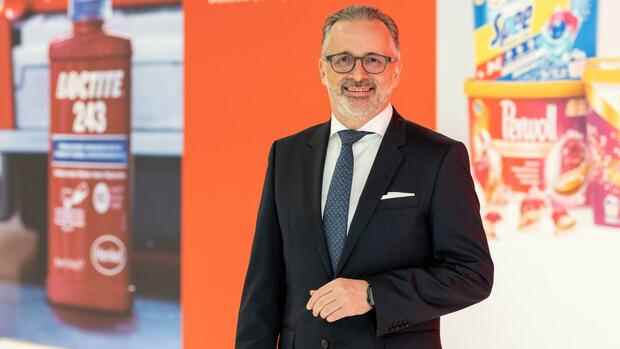Dusseldorf Carsten Knobel hadn’t sorted his documents properly when asked about the Russian business of all things. The Henkel boss switched off his microphone, looked at the head of the supervisory board, Simone Bagel-Trah, and leafed through his manuscript. Then came the answer to the question submitted by a shareholder advocate: “We are deeply shocked by the Russian invasion and the war in Ukraine.” And then there was a whole series of reasons why the Persil manufacturer was one of the few German companies to initially its activities in Russia.
The scene at Henkel’s Annual General Meeting, which took place digitally on Monday due to the corona, shows the great public pressure that weighs on the consumer goods group and its CEO. While many Western companies have withdrawn from Russia, some of them suffering heavy losses, Henkel wants to continue producing there for the time being.
Hardly any other Dax group invests in Russia: Henkel achieves five percent of its group sales there – around one billion euros. The 2,500 employees in the eleven Russian plants mainly produced for the local market, explained Knobel.
In Russia, Henkel sells everyday products such as household, personal care and hygiene products, but also applications for DIY and construction, such as adhesive, sealing and insulation systems.
Top jobs of the day
Find the best jobs now and
be notified by email.
“Risk of Expropriation”
Meanwhile, the 53-year-old justified his adherence to the Russian business as follows: “In Russia there is a risk that subsidiaries of foreign companies could be expropriated by the government in the future.” In this case, the Russian government would receive considerable assets.
Five percent of Henkel’s group-wide tangible assets are located in Russia. An expropriation would probably cost the group a three-digit million amount. In addition, the local management could be held personally liable in the event of a withdrawal. “We don’t make light-hearted decisions,” said Knobel.
Henkel sells everyday products such as household, personal care and hygiene products in Russia.
(Photo: Bloomberg/Getty Images)
Already on Friday, Henkel’s chief supervisor Bagel-Trah explained in the Handelsblatt: “The current continuation of our business in Russia is not a question of profit in view of the weak ruble and the difficulties in the country.” Henkel has at least stopped its new business in Russia and does not place any advertising more, the sanctions would be adhered to.
>>> Read more: Henkel chief supervisor defends adherence to business in Russia
But that’s no longer enough for many shareholders. Ever since pictures of alleged Russian atrocities in Ukraine became public over the weekend, doubtful words have increasingly been mixed into Knobel’s statements.
The group is also threatened with damage to its image, as the Henkel boss admitted. “We will continue to monitor the situation carefully and, if necessary, adjust our decisions and measures – with a sense of proportion, with compassion and deep concern.” One is in talks with the federal government, associations and other companies.
CEO of Henkel for two years
For Knobel, it is probably the most difficult time as CEO of Henkel. He succeeded Hans Van Bylen two years ago. Before that, Knobel was CFO for seven and a half years, and the native of Hesse has worked at Henkel since 1995.
As if the current Russia problem wasn’t enough, Knobel also has to work on many other construction sites in the group: Shortly after Knobel took over as CEO, the pandemic broke out, since then Henkel has been struggling with interrupted supply chains and unprecedented increases in raw material costs, which are at least partially passed on could.
The cosmetics business with brands like Fa, Schauma or Schwarzkopf has been weakening for years, and profitability is significantly lower than that of the competition. And it is precisely in the important US market that sales of detergents are faltering. Still, the industrial adhesives business, which is important for Henkel, is growing.
>>> Read more: Falling share prices and profits: Henkel loses touch with the competition
Overall, however, Henkel’s share price has fallen significantly: The share price is currently around 60 euros – only half as high as in 2017. “We know that this is more than disappointing,” admitted Knobel. The manager is now trying to position the group better by restructuring the consumer goods divisions. He wants to merge the ailing cosmetics business with the better-performing detergents and cleaning agents sector and its well-known brands such as Persil and Pril.
Knobel expects faster decisions, more targeted innovations and more growth from the newly formed “Consumer Brands” unit. The manager is also hoping for synergies. This means that sales people from both company divisions no longer have to negotiate with the same customers, as was previously the case. However, this also means that employees will be laid off. Knobel wants to announce details when the quarterly figures are presented at the beginning of May.
But first he has to settle the business with Russia. The final decision on this does not seem to have been made in Düsseldorf.
More: Persil manufacturer Henkel restructures and lays off employees
